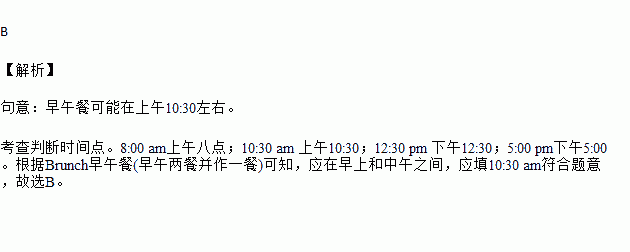题目内容
Brunch might happen around__________.
A.8:00 am B.10:30 am C.12:30 pm D.5:00 pm
阅读下面短文,根据短文内容判断句子正误。正确的涂“A”,错误的涂“B”。
San Guo Tea House
San Guo Tea House gives a wonderful welcome to everyone from all over the world. You can enjoy Chinese tea and taste Sichuan-style snacks(零食). Also different kinds of traditional Sichuan art shows are waiting for you here. Here are the shows that will be on next week.
Date | Show | Ticket Price |
Sunday, January 12 | Talk shows | ¥90 |
Monday, January 13 Tuesday, January 14 | Magic shows Sichuan Opera | ¥100 ¥120 |
Wednesday, January 15 | Acrobatic(杂技)shows | ¥110 |
Thursday, January 16 | Sichuan Opera | ¥120 |
Friday, January 17 | Music shows | ¥80 |
Saturday, January 18 | Dance shows | ¥100 |
All the shows are from 7:50 p.m.to 9:20 p.m. |
Opening time: 10:00 a.m.~10:00 p.m.
Location: Jinli Street, Wuhou
Get more information on www.sanguo-tea-house.com.
1.You can enjoy Chinese tea, Sichuan—style snacks and traditional Sichuan art shows in San Guo Tea House.
2.On Friday, January 17, you can watch magic shows.
3.Mr. Wang goes to watch Sichuan Opera with three friends, he should pay 360 yuan.
4.Each show is 90 minutes and the cheapest ticket is 80 yuan in San Guo Tea House.
5.San Guo Tea House is open for 10 hours every day.

